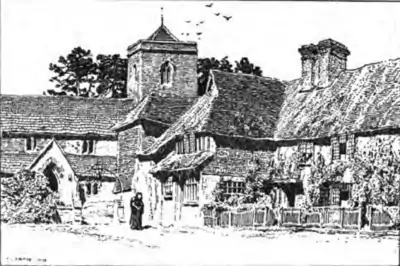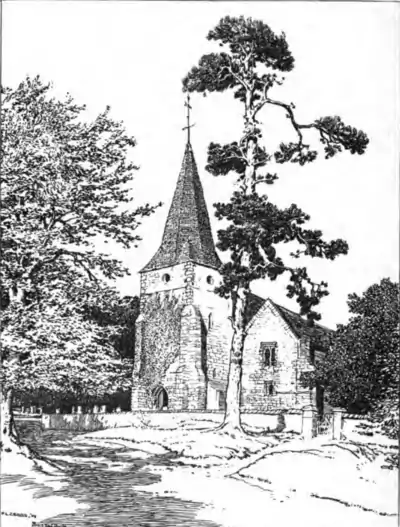CHAPTER XXXI
UCKFIELD AND BUXTED
The Crowborough district—Isfield—Another model wife—Framfield—The poet Realf—Uckfield—The Maresfield rocks—Puritan names in Sussex—Buxted park—Heron's Ghyll—A perfect church.
Uckfield, on the line from Lewes to Tunbridge Wells, is our true starting point for the high sandy and rocky district of Crowborough, Rotherfield and Mayfield; but we must visit on the way Isfield, a very pretty village on the Ouse and its Iron River tributary. Isfield is remarkable for the remains of Isfield Place, once the home of the Shurleys (connected only by marriage with the Shirleys of Wiston). The house can never have been so fine as Slaugham Place, but it is evident that abundance also reigned here, as there. Over the main door was the motto "Non minor est virtus quam querere parta tueri," which Horsfield whimsically translates "Catch is a good dog, but Holdfast is a better." In the Shurley chapel, one of the sweetest spots in Sussex, are brasses and monuments to the family, notably the canopied altar tomb to Sir John Shurley, who died in 1631, his two wives (Jane Shirley of Wiston and Dorothy Bowyer, née Goring, of Cuckfield) and nine children, who kneel prettily in a row at the foot. Of these children it is said in the inscription that some "were called into Heaven and the others into several marriages of good quality"; while of Dorothy Shurley it is prettily recorded (this, as we have seen, being a district rich in exemplary wives) that she had "a merite beyond most of her time, … her pitty was the clothing of the poore … and all her minutes were but steppes to heaven." Our county has many fine monuments, but I think that, this is the most charming of all.
At Framfield, two miles east of Uckfield, which we may take here, we again enter the iron country, and for the first time see Sussex hops, which are grown largely to the north and east of this neighbourhood.

Framfield.
Framfield has a Tudor church and no particular interest. In 1792 eleven out of fifteen persons in Framfield, whose united ages amounted to one thousand and thirty-four years, offered, through the county paper, to play a cricket match with an equal number of the same age from any part of Sussex; but I do not find any record of the result. Nor can I find that any one at Framfield is proud of the fact that here, in 1834, was born Richard Realf, the orator and poet, son of Sussex peasants. In England his name is scarcely known; and in America, where his work was done, it is not common knowledge that he was by birth and parentage English. Realf was the friend of man, liberty and John Brown; he fought against slavery in the war, and helped the cause with some noble verses; and he died miserably by his own hand in 1878, leaving these lines beside his body:—
"De mortuis nil nisi bonum." When He was a-weary, but he fought his fight, |
Uckfield's main street is divided sharply into two periods—from the station to the road leading to the church all is new; beyond, all is old. The town is not interesting in itself, but it commands good country, and has a good inn, the Maiden's Head. It is also a good specimen of the quieter market-town of the past—with a brewery (hiding behind a wonderful tree braced with kindly iron bands), a water mill (down by the railway), and several solid comfortable houses for the doctor and the lawyer and the brewer and the parson, with ample gardens behind them.
Uckfield was once the home of Jeremiah Markland, the great classic, who acted as tutor here to Edward Clarke, son of the famous William Clarke, rector of Buxted, and father of Edward Daniel Clarke, the traveller. It is agreeable to remember that Fanny Burney passed through the town with Mrs. Thrale in 1779, although she found nothing to interest her.
Uckfield is the southern boundary of the rock district of which we saw something at West Hoathly, and it is famous for the sandstone cliffs in the grounds of High Rocks, an estate on the south of the town. The unthinking untidiness and active penknives of the holiday makers made it recently necessary for the grounds to be closed to strangers. Close by, however, just off the road from Uckfield to Maresfield, is a rocky tract that is free to all. It consists of about an acre of grey, sandy boulders, some rising to a height of twenty feet or so, which remind one a little of the rochers in the Forest of Fontainebleau, although on a smaller scale. All are worn with the feet of adventurous boys enjoying one of the best natural playgrounds in the county. Here blackberries come to rich perfection, the sun's ripening warmth being thrown back from the hot sand.
When I first knew Maresfield church, many years ago, its aged vicar rolled out "Thou shalt do no mur-r-r-der" with an accusing timbre that seemed to bring the sin home to all of us. He had also so peculiar a way of pronouncing "Albert," that his prayer for our rulers seemed to make an invidious distinction, and ask a blessing, not for all, but for all but Edward, Prince of Wales.
Some of the oddest of the composite pietistic names that broke out over England during the Puritan revolution are to be found in Sussex registers. In 1632, Master Performe-thy-vowes Seers of Maresfield married Thomasine Edwards. His full name was too much for the village, and four years later is found an entry recording the burial of "Vowes Seers" pure and simple. The searcher of parish registers from whose articles in the Sussex Daily News I have already quoted, has also found that Heathfield had many Puritan names, among them "Replenished," which was given to the daughter of Robert Pryor in 1600. There was also a Heathfield damsel known as "More-Fruits." Mr. Lower prints the following names from a Sussex jury list in the seventeenth century: Redeemed Compton of Battel, Stand-fast-on-high Stringer of Crowhurst, Weep-not Billing of Lewes, Called Lower of Warbleton, Elected Mitchell of Heathfield, Renewed Wisberry of Hailsham, Fly-fornication Richardson of Waldron, The-Peace-of-God Knight of Burwash, Fight-the-good-fight-of-Faith White of Ewhurst, and Kill-sin Pemble of Withyham. Also a Master More-Fruits Fowler of East Hoathly, for it seems that in such names there was no sex.
Among the curious Sussex surnames found by the student of the county archives who is quoted above are the following:—
| Pitchfork | Sweetname | Lies |
| Devil | Slybody | Hogsflesh |
| Leper | Fidge | Backfield |
| Handshut | Beatup | Breathing |
| Juglery | Rougehead | Whiskey |
| Hollowbone | Punch | Wildgoose |
| Stillborne | Padge | Ann. |
Almost every name here would have pleased Dickens, while some might have been invented by him, notably Fidge and Padge. One can almost see Mr. Fidge and Mr. Padge drolling it in his pages.
From the Maresfield rocks Buxted is easily reached, about a mile due east; but a far prettier approach is through Buxted Park, which is gained by a footpath out of Uckfield's main street. The charm of Buxted is its deer. Sussex, as we have seen, is rich in parks containing deer, but I know of none other where one may be so certain of coming close to these beautiful creatures. Nor can I recall any other deer that are so exquisitely dappled; but that may be because the Buxted deer were the first I ever saw, thirty years ago, and we like to think the first the best. Certainly they are the friendliest, or least timid. The act of going to church is invested at Buxted with an almost unique attraction, since the deer lie hard by the path. Indeed, the last time I went to church at Buxted I never passed through the door at all, but sat on a gravestone throughout the service and watched the herd in its graceful restlessness. That was twelve years ago. The other day I watched them again and could see no change. Some of the stags were still as of old almost bowed beneath their antlers, although one at any rate was free, for a keeper who passed carried a pair of horns in his hand.
The old house at the beginning of the footpath to the church, with a hog in bas-relief on its façade, is known as the Hog House, and is said to have been the residence of Ralph Hogge. Who was Ralph Hogge? Who is Hiram Maxim? Who was Krupp? Who was Nordenfelt? It was Ralph Hogge, iron-master, who in the year 1543 made the first English metal cannon. So at any rate say tradition and Holinshed. Buxted is otherwise most pacific of villages, sleepy and undiscovered.

In Buxted Park.
On the road between Maresfield and Crowborough is Heron's Ghyll, the residence of Mr. Fitzalan Hope. It stands to the east of the road, in one of those hollow sites that alone won the word "eligible" from a Tudor builder. Hard by the road is the perfect little Early English Roman Catholic church which Mr. Hope built in 1897, a miracle, in these hurried florid days, of honest work and simple modest beauty. The church being Roman Catholic one may with confidence turn aside to rest a little in its cool seclusion, relieved of the irritating search for the sexton of the national establishment, and freed from his haunting presence and suggestion that the labourer is worthy of more than his hire.
While on this subject I might remark that a county vicar describing the antiquities of his neighbourhood in one of the Sussex Archæological Society's volumes, writes magnanimously: "A debt of gratitude is certainly due to our Roman Catholic predecessors (whatever error might mix itself with their piety and charity) for erecting such noble edifices, in a style of strength to endure for a late posterity." It seems to me that a very simple way of discharging a portion of this debt would be to imitate the excellent habit of leaving the church doors wide open, as practised by those Roman Catholic predecessors. My own impulse to enter many of the Sussex churches has been principally antiquarian or æsthetic, but to rest amid their gray coolnesses is a legitimate desire which should be fostered rather than discouraged, particularly as it is under such conditions that the soul even of the stranger whose motive is curiosity is often comforted. The arguments in favour of keeping churches closed are unknown to me. Doubtless they are numerous and ingenious, but, doubtless equally, a locked church is a confession of failure; while to urge that one has but to ask for the key to be able to enter a church is no true reply, since hospitality, whether to the body or the soul, loses in sweetness and effect as it loses in spontaneity.
From Heron's Ghyll to Crowborough is a steady climb for three miles, with the heathery wastes of Ashdown Forest on the left and the hilly district around Mayfield on the right.